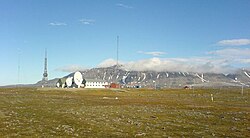Isfjord Radio
| Isfjord Radio | |
|---|---|
| Radio station | |
 |
|
| Coordinates: 78°03′08″N 13°36′04″E / 78.05222°N 13.60111°ECoordinates: 78°03′08″N 13°36′04″E / 78.05222°N 13.60111°E | |
| Country | Norway |
| Region | Svalbard |
| Island | Spitsbergen |
| Land area | Nordenskiöld Land |
| Established | 13 November 1933 |
| Founded by | Norwegian Polar Institute |
| Population | |
| • Total | 0 |
| Time zone | Central European Time (UTC+1) |
| • Summer (DST) | Central European Summer Time (UTC+2) |
| Postal code | 9172 |
| Postal place | Isfjord på Svalbard |
Isfjord Radio is a coast radio station and weather station located at Kapp Linné on the island Spitsbergen in Svalbard, Norway. The station was established in 1933, and has played an important role in the telecommunications between the Svalbard archipelago and the outside world. The station was destroyed during World War II, and rebuilt in 1946. The station was important for ships traffic and air traffic. Satellite communications were established in 1979, but depreciated when a fiber optic cable between Svalbard and the mainland was finished in 2004. Isfjord Radio was automated and depopulated in 1999. Parts of the outdated installations have been preserved as a historical site.
During the early 1930s there were two main coast radio stations in Svalbard: Svalbard Radio in Longyearbyen and Barentsburg Radio. Ship traffic for export of coal increased during the period, but neither of the coast radio stations had good coverage and in 1932 there were two Soviet ships which went aground. Arktikugol took initiative to better the navigational aids in Isfjorden, including a better location for a coast radio station. Planning was carried out between the Lighthouse and Buoy Authority, the Telegraphy Administration, the Ministry of Trade and Industry and the Norwegian Polar Institute, resulting in Kapp Linné being proposed as a suitable location for a radio station. The plans were approved by Parliament on 16 May 1933, along with a grant of 100,000 Norwegian krone (NOK). On 19 June Parliament allocated additional spending to purchase the land Russekeila from Arthur S. Lewin.
...
Wikipedia

